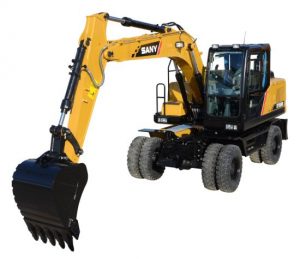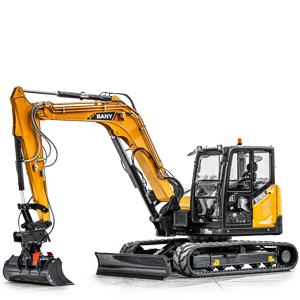When evaluating excavators, you will most likely choose between a wheel and tracked excavator. These two types of excavators are quite different in their advantages and disadvantages. In this guide, we’ll help you compare the two varieties so you can make an informed decision when buying or renting your excavator equipment.
What are excavators?
Excavators are earth-moving equipment (usually tracked or wheeled) that efficiently dig large lumps of land. The digging attachment can then be used to transfer these lumps to more strategic locations or near discarding areas. They are powerful tools used in major construction services, tunnel digging, and even mine excavation all around the world.
There are many industrial excavators out there, each with different attachments and configurations. However, if you really want to finish projects quickly and efficiently, you may want to use the right tool for the right job.
Wheel Excavator
A Wheel Excavator is—you guessed it—an excavator equipped with wheels. It has your standard buckets used to lift heavy mounds of earth and transfer them to another work area. Wheel excavators are incredibly versatile; wheels make them highly stable and mobile. They are often also lightweight, making them a crowd favourite for general or small-scale projects.
Tracked Excavator
A tracked excavator is a type of excavator that uses caterpillar tracks for mobility. Tracked excavators are typically used in mining and heavy construction. They are sometimes called ‘caterpillar’ or ‘bulldozer’ tractors because they resemble the caterpillar track system on military tanks.
Which should you choose?
There are a few things to consider when deciding whether tracked or wheeled is better for a project. Knowing what the project is and what the machine needs to do will help you make a well-informed decision that will help you use your time and money in the best way possible.
- The area’s terrain and stability
In construction areas, there’s no such thing as a “perfect terrain.” The terrain sometimes even causes delays in work because there are many things to adjust the work for, including the land levels, the strength and stability of the soil (for projects that need deep burrowing), and the type of soil where your tractor will move on. When you think of terrain, your priority should be the safety of your equipment and builders. So which excavator should you go for?
For uneven and unstable land: Go for tracked excavators. Tracked excavators specialise in mobility against unforgiving land heights and slopes. If your work area is also hilled, you might want to swap to a tracked one because it is heftier and, therefore, less prone to tilt. Plus, you don’t have to worry about punctures from random rocks or jagged materials because you don’t have wheels to begin with!
For street, bridge, and city work: Your best bet is a wheeled excavator. In long lengths of level soil, you should invest in mobility. Since wheeled excavators are usually lighter and travel faster, you can work at multiple points on the site, and they won’t damage the roads it travels on. Workers also enjoy its agility when equipped with a good bucket.
- Transportation capabilities
If your company garage is a bit far from your construction site, you may have to choose a specific excavator to balance transportation costs and response speed when needed. For example, some areas (usually on undeveloped sites) don’t have dedicated parking, and you may feel hesitant to leave equipment on-site for extended periods. In this case, here are some comparisons to consider:
If you have a dedicated transport truck or a vehicle carrier trailer: Tracked excavators are best. They can be more versatile in the work site, and since transferring from one area to another is not a problem for you, a track excavator can do more for less.
If your garage is near or you have no carriers: Wheeled excavators are the way to go. Since wheeled excavators move faster and can travel longer distances over roads, they can be more economical to use.
- Maintenance efforts and costs
Even excavators that are built like tanks need some TLC from time to time. However, tracked and wheeled excavators have different needs from you, so you need to consider if you have enough crew ready for regular maintenance and if you have the budget for each tractor’s specific needs.
If you have the maintenance resources: Tracked excavators are for you. Since the tracks and the undercarriage of the tracked excavator are more complex and have more moving parts than a wheeled excavator, you need to dedicate more time, money, and effort to maintaining a tracked excavator.
If you are working on a budget: Wheeled excavators are cheaper and easier to maintain. It has fewer parts to work on. Plus, its hubs, breaks, and tyres are more affordable than that of a tracked excavator. However, even though tires last longer, remember that you have to replace them all at the same time after extended periods of use.
Get the Best Excavators From Us
If it were up to us, we would prefer that your business has one of each type of excavator. However, it will still boil down to the nature and needs of your work. Talk with your project managers, architects, and engineers to figure out which excavator will give you more than you expect.
As a proud global distributor of heavy equipment and earth-moving machinery, YELLO Equipment’™s main goal is to sell reliable, affordable, and effective machinery. Because of this, we know how important quality products, ongoing customer support, and in-house servicing expertise are.
We will also be happy to discuss specifications and give you quotes once you’ve decided! You can reach out by telephone at 1300 093 556 or send us an email at sales@yelloequipment.com. You can also reach out to us here.

